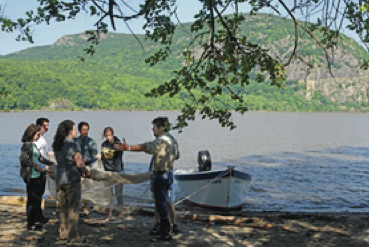
Pace will be offering its first ever Environmental Policy and Practice Clinic starting in the spring of 2014 on the Pleasantville campus.
The Environmental Policy and Practice Clinic (EPPC) is a Learning Community comprised of two courses, Environmental Information, Communication and Innovation, and the Environmental Clinic. The two courses together are six credits and allow students to fulfill an Area of Knowledge one (AOK1) course as well as a writing enhanced (WE) requirement.
“These courses will provide a lens on the processes that shape how we care for, or neglect, the environment in which all other aspects of our lives play out… doing business, raising a family, hiking and fishing, and everything else,” Professor Andrew Revkin said. “Students will work in a team environment, as a professional ‘firm,’ with faculty from the Pace Academy and from throughout the university, including the Law School.”
According to the Pace Academy for Applied Environmental Studies, the two professors involved in the clinic, John Cronin and Andrew Revkin, are both nationally and internationally recognized as experts in environmental issues. Students will have the opportunity to work alongside both of these professors to create a learning experience that may change their lives.
“Professors Cronin, Land and I share a passion for dissolving walls between disciplines,” Professor Andrew Revkin said. “Specialized knowledge is vital but only gets put to use when it’s part of a bigger conversation. We all are also practitioners as well as scholars.”
With the incorporation of much more than a typical environmental studies course, the clinic offers a large scope of knowledge that can apply to students of all majors.
“EPPC is designed to be a professional training ground and community service opportunity for all undergraduate students, no matter their interests,” Professor John Cronin said. “We are encouraging students from all majors to register because understanding advocacy skills is necessary for everyone, every profession, and every aspect of society.”
The idea behind the development of these courses is that they are much more than just requirement fulfilling, they are courses that all students would benefit from and learn how they fit into the environmental world.
“The helpful thing about environmental policy is that it is the intersection of law, business, natural sciences, economics, political science, health, history, education, technology and more. Look at climate change…it is in the headlines every day because every segment of society has a stake in it,” Cronin said. “Environmental policy is a diving board that lands you in the center of the national political and social conversation…and no matter your career, you will eventually encounter environmental policy issues. EPPC also has the added benefit of bringing a unique experiential and service dimension to student resumes.”
EPPC students will work with the Pace Academy for Applied Environmental Studies and have full advantage of the workspace and support facilities that it provides to them full-time. Pilot courses have been taught by the Pace Academy faculty that have already tested the undergraduate clinical model, which is very similar to these courses.
“Based on the experiences [of the pilot courses], and the mission of Pace Academy to involve students from all majors, and faculty from all schools of the university, we decided to offer this six-credit clinic that provides undergraduate students a professional-level experience,” Cronin said. “We are as excited about it as we know the clinic students will be.”
Some students have already expressed the interest that they have in the course; with registration occurring this week, they were planning their schedules to make sure that the class fit in.
“It sounds interesting and I feel like it’ll be cool to be a part of the first group of undergraduates in the course since up until now, graduates have only had this opportunity,” junior applied psychology major Mychael Lotoky said. “It’ll be fun to be a part of the start of undergraduate involvement in the course. It will be a good experience to have a client and work through the problems with them, like a real-world experience.”
Both students and the professors are looking ahead to the brand new experiences that can be had with this first of its kind environmental clinic.
“We’re passionate about fostering a culture of innovation and inspiration,” Revkin said. “These courses, as a laboratory, will shape shift each year depending on the issues of the day, reflecting that spirit.”

